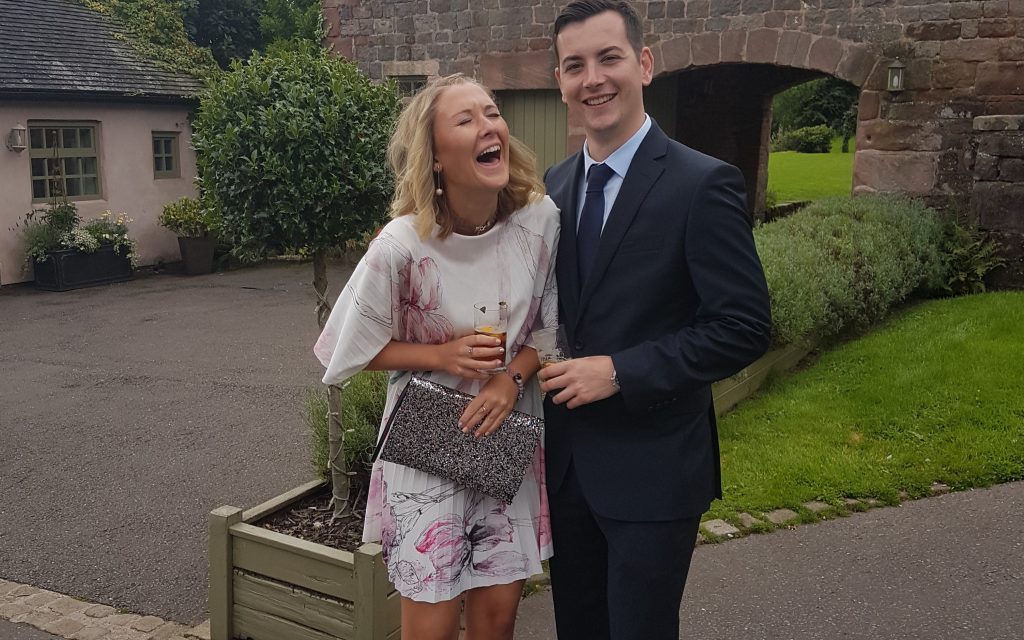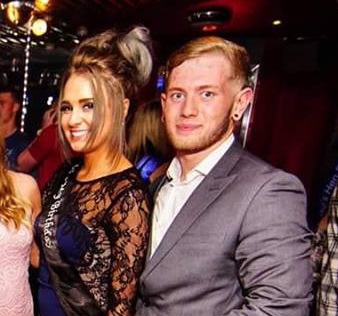Relationships require a great deal of work and attention to ensure they remain positive and healthy. However, when one person is diagnosed with a brain tumour, this can feel even harder and maintaining a relationship can be difficult.
But love can win the day, so we spoke to three couples, who have been together from a few months to many years to share their stories on how they first spoke about their brain tumour to their partner, and their top tips for maintaining a healthy relationship.
Beth (26, living with a brain tumour) and Sam (26)
Beth and Sam first met during a Duke of Edinburgh residential trip, before Beth was diagnosed with a brain tumour. Eight years later and they’re still going strong.

When I found out I had a brain tumour it was actually my mum who told Sam, over the phone. He was shocked but also really practical and realistic, which was reassuring and comforting – I knew he’d be there to support me.
If I were to give couples starting out some top tips I’d say make sure you keep each other company, but also you should both understand that sometimes you may need space (whether you’re the one with a brain tumour or not) and it’s important to let the person have this for as long as they need. This requires a lot of patience, which you’ll definitely need. And finally, I’d say, remember that you, as the cancer patient, are allowed to feel however it is you are feeling and your partner should accept that and be supportive and willing to help.
What’s the best gift you’ve given each other?
The best gift I ever got from Sam was a letter when I was at university – it was simple but so thoughtful, it meant a lot.
The best gift I ever got from Beth was a take-away – it was a complete treat (and delicious!)
Annalise (19, living with a brain tumour) and Eoin (20)
Annalise and Eoin first met through Annalise’s neighbour eight years ago and became friends. Eventually, love blossomed and the pair have now been together for three years. They’ve been together right through Annalise’s diagnosis and treatment.

We are very open and honest with each other, so during my appointments, MRI and after my meeting with the Neurosurgeon who told me about my brain tumour, I kept Eoin up-to-date either over the phone or in person, so we could talk about the details.
When I first told Eoin, he was shocked and upset, which is normal, but, Eoin also felt guilty, which I couldn’t understand at the time. He was there for me every step of the way, through all my anger, giving me patience while it sunk in. Now, we have a name for my brain tumour (Roger), which helps me find humour to get on with it and now I don’t feel angry and am much happier with myself.
To anyone else in a relationship and diagnosed with a brain tumour I would say, don’t shut your partner out (or anyone for that matter). They will want to comfort you and help you through your diagnosis, they will be there no matter what and it’s good to have them to talk to. But you also need to help them understand, they are going to have so many questions to be able to understand. Take your time obviously, and answer questions only when you’re ready, but don’t push them away. Finally, carry on with your usual routines, don’t isolate yourself. You are still you! Nothing has changed, so just have fun.
What’s your go to date idea to keep the relationship fresh?
Once a month we get suited and booted and go out for a meal – it’s a great time to have fun, reconnect, and make an effort for each other.
Jen (23, living with a brain tumour) and Callum (24)
Jen and Callum are a modern day romance having met on an online dating app. Jen had already been diagnosed with her brain tumour and had had surgery to remove it when they first met. Jen and Callum have now been together 10 months and are enjoying being in each other’s company.

I had already undergone treatment for my brain tumour when I joined the dating app and included a picture of myself with no hair and my scar visible on my profile. Callum asked over messages on the app about my ‘trendy’ look so I mentioned the brain tumour then and got it out of the way early on, explaining the full details of my condition on our first date when I showed up without a wig, sporting a buzz cut hair do.
Callum was really supportive. He complimented my appearance straight away and said I looked ‘really edgy’ and my short hair ’emphasised my eyes and smile’. He was genuinely interested in my welfare and hearing ‘my story’ without making me feel like I was being interviewed as some people make me feel. He took in all the information I told him about my condition and made me feel confident and supported.
If I were to give couples any advice it would be to be honest – about how you’re feeling, about your story, and about your condition. It’s important because they’ll be the person who sits through all this with you, so you can’t shut them out. Together you are tougher than apart and being in their arms can provide that little bit of light on even the darkest days. It will take a toll on your relationship, but if you can fight through diagnosis, trust me, you can fight through anything life throws at you. And Callum agrees.
Communication is everything! It’s important to remind yourself there are two people in a relationship and it’s important for each person to fully understand what each person wants to do when receiving news of a diagnosis. It’s also important to have a long term plan. We both felt it was necessary to talk about houses, marriage and children way before we wanted to. It was uncomfortable at times but it was important to know what each other’s goals were and when we wanted to achieve them in order to move our relationship forward. I’d also say, as someone without a brain tumour, it’s important to meet with support groups regularly. I got the chance to meet the Brainy Bunch, who took part in the Iceland Trek 2017 with Jen, they were a fantastic group of people, and it was great to be a part of this area of Jen’s life.
What’s the worst gift you’ve given/received?
Jen ordered me a pair of jeans online once. When they arrive they were like a pair of men’s light blue leggings. Gross!
Relationship Support
We know that a brain tumour diagnosis often impacts the wider family. In our ‘Losing Myself’ report, 2 in 3 said that they had seen a negative impact on their relationship with their partner, while 72% have had physical intimacy affected. Studies show that it is the personality and cognitive effects of brain tumours that place the most strain on relationships, particularly where they cause behaviour change, but that techniques to support caregivers can make a positive difference.
We have been working in partnership with OnePlusOne – a charity that specialises in relationship building – to investigate the experiences of those affected by a brain tumour and possible support needs. If you would like to contribute to our work on developing bespoke relationship support for those affected by a brain tumour, please contact the Information and Support team on 0808 800 0004 or email us at [email protected] – we would love to hear from you.
In the meantime, you might be interested in Click – an online resource that’s been developed by OnePlusOne to provide general relationship support and help you strengthen your relationships. It features a professional-led listening room, moderated community posts, evidence-based articles, goal-setting, quizzes, and personalised recommendations to help you improve and maintain the quality of your relationships.
